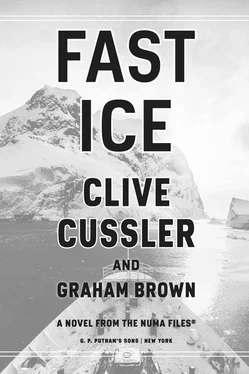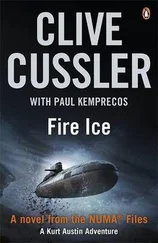1
RESEARCH VESSEL GRISHKA
NORTH OF THE ANTARCTIC COAST
THE PRESENT DAY
The polar research vessel Grishka moved cautiously through the Southern Ocean a hundred miles from the coast of Antarctica. The ten-thousand-ton ship had a gray hull, a reinforced bow and a five-story superstructure painted a faded shade of international orange. She was three hundred feet in length but looked tiny when compared to the mountainous icebergs surrounding her.
Some of those icebergs were flat and broad, tabletop monoliths the size of cities. Others were towering peaks, their Matterhorn-like shapes sculpted by the wind and waves into arrangements as different as they were remarkable. And yet among all the giants, it was the much smaller type of iceberg that threatened the Grishka.
From her position on the bridge, Cora Emmerson gazed through binoculars, scanning the water for automobile-sized chunks of ice that floated low and were almost invisible.
“Growlers dead ahead,” she warned.
Unlike sea ice, which the Grishka could plow through, or the enormous icebergs, which were easy to spot and avoid, growlers were hard to see and could be deadly. They varied in size and shape and could weigh thirty tons or more. Worse yet, they were often angular instead of smooth-sided, resulting in a tendency to puncture a ship’s hull rather than glancing harmlessly off it.
“We’ve got another set off the port bow,” Cora warned. “Five degrees to starboard and we’ll clear them all.”
The captain of the ship, Alec Laskey, made the turn without questioning. Cora had been at his side on the journey down to Antarctica and had barely left the bridge since they began traveling north twelve hours before.
She had remarkable stamina, he thought. And a keen eye. “I’m certain you must have been a sailor in a former life.”
“I can neither confirm nor deny that rumor,” Cora said, “but I’ve been doing Antarctic research for years now. This is my seventh trip to the continent. And, before that, I worked for the American nautical agency NUMA. It would be a shame if I hadn’t picked up something along the way.”
“I’d say you picked up a few things,” Laskey replied. “You’re vigilant.”
Yes, she thought . And I have reason to be.
After months of searching, Cora’s expedition had discovered something both unique and dangerous. If she was right, it had the potential to alter the world. In the right hands it could be a salve for the damaged planet, but in the wrong hands it could be turned into a weapon. Regardless of its use, there were those who would prefer such a discovery had never been made at all.
Whether it was paranoia or an overactive sixth sense, Cora had felt they were being tracked even before the discovery. Getting off the ice and aboard the Grishka had eased that fear. Until they reached Cape Town, however, she wouldn’t feel safe.
“New heading established,” the captain said. “Are we clear?”
Cora swung the binoculars back toward the growlers. They rose and fell as the bow wave of the ship passed, jostling against one another. A foam of bubbles appeared as one of the miniature icebergs rolled over, disappeared briefly and then bobbed to the surface with a different side pointed skyward.
“Ice has been cleared and is falling behind us,” she said.
Cora watched the growlers and then turned her attention to the path ahead. What had once looked wide open now appeared less so. A mile in front of them, a midsize iceberg—larger than the Grishka but smaller than the mountains of ice in the distance—was moving into their path.
The iceberg was an odd shape. But, then, no two were ever alike. It had a flat top, like the city-sized bergs that broke off from the glaciers, but its nearest end was sharply angled. Small peaks rose from various parts.
The ice itself was an odd color. Instead of pure white or a ghostly blue, this one looked jaundiced, as if it had been dusted with volcanic ash.
“Is there a current here?” Cora asked.
“West wind drift,” Laskey said. “Just like everywhere else around Antarctica.”
“But nothing locally?”
“Not that I know of.”
“Then why is that iceberg tracking east instead of west?”
Laskey glanced toward the encroaching iceberg. “Optical illusion.”
“I don’t think so.”
The captain seemed unconcerned but motioned toward an old cathode-ray screen. “Check the radar.”
Cora moved to the ship’s rudimentary radarscope. It was an ancient device, with lines burned into the screen that remained there even when the unit was switched off. She set it to tracking mode and waited for the information to appear. After a dozen sweeps, it confirmed what her eyes were telling her. “That berg is moving southeast at a speed of four knots.”
“Wind?” Laskey asked.
Cora checked the ship’s anemometer. It registered five knots, coming from due north. A quick check of the pennant on the bow confirmed this. “Perhaps the back side of the iceberg is oddly shaped. It might be catching the breeze and acting like a sail.”
Now the captain grew concerned. He cut the throttle and the Grishka settled and slowed to a crawl. “Too dangerous to try rounding it,” he said. “God knows what’s hidden under the surface. We’ll stop here and wait for it to pass.”
But the iceberg didn’t pass. Whatever combination of currents and wind were moving it, the floating monolith lost its eastward momentum and began to move due southward, directly toward the Grishka.
Cora felt her chest tightening. “It’s coming toward us.”
“Impossible,” Laskey said.
“Look for yourself.”
He didn’t bother. He cut the throttle to full stop and then placed it into the reverse position at quarter speed. The old ship responded slowly, shuddering and seeming to rest before it finally started to withdraw.
“You’re taking us back into the pack ice?”
“Better than getting too close to this one,” the captain said. “It could rupture our hull with the slightest impact. It could crush us if it tumbled.”
The Grishka picked up momentum, putting some space between itself and the encroaching iceberg. But it wasn’t long before a grinding reverberated through the hull.
Laskey stopped the engines. “Those would be the growlers,” he said. “Must have drawn them into our wake when we passed. I need eyes at the stern if we’re going to keep moving.”
“I’ll go,” Cora said.
Picking up a handheld radio, she left the bridge. She took a ladder down five levels to the main deck and then went aft. She passed no one, as it was early morning and most of the crew were asleep.
Stopping near the aft hatchway, she grabbed a heavy parka from a storage locker. Slipping it over her shoulders and zipping it up, she pushed out into the elements.
The bitter cold hit her instantly, the wind stinging her face and hands. She pulled the fur-fringed hood up around her face and slipped her free hand into a pocket.
With the radio in the other hand, she crossed the helicopter pad, where the expedition’s EC130 was tied down. The helicopter’s windows were frosted over but its rotors were covered by specially heated sleeves.
Passing the landing pad, she reached the stern, where a pair of large winch housings stood. Moving between them, she glanced over the aft rail.
To her surprise, they were already moving backward and picking up speed. Deep baritone reverberations told her they were ramming small chunks of ice with the stern’s blunt end.
The nearest sections of ice were not too threatening, but larger growlers lay directly in their path.
Читать дальше












